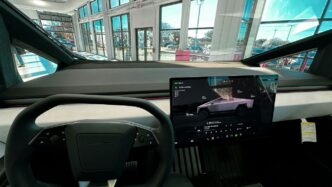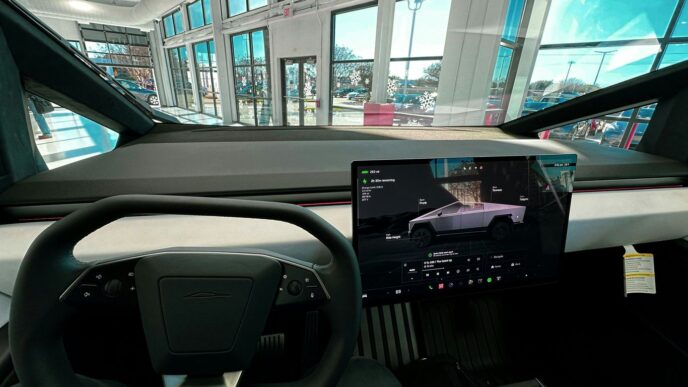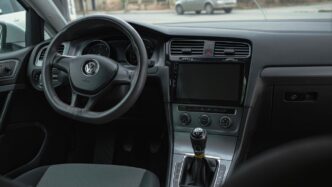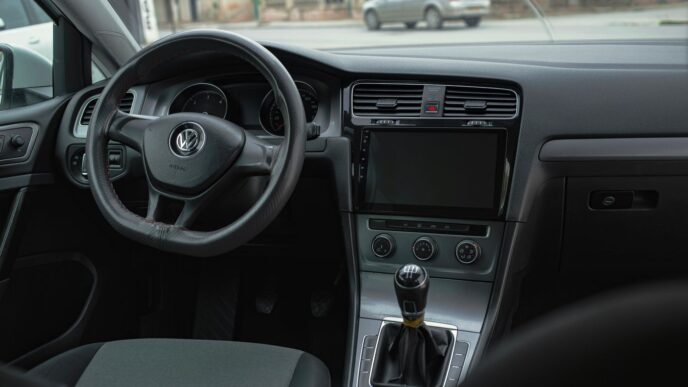It looks like Toyota and BYD are teaming up. This is pretty big news in the car world, especially for electric vehicles. Toyota, a company that’s been around forever, is working with BYD, a major player from China that’s really making waves with its EVs. They’re forming a new company and planning to build new cars together. It seems like a smart move for Toyota, given how fast the electric car market is changing, and BYD has some serious tech, like their Blade Battery. We’ll have to see what comes out of this partnership, but it’s definitely something to keep an eye on.
Key Takeaways
- BYD and Toyota have joined forces to develop and manufacture electric vehicles, creating a new entity called BYD Toyota EV Technology Co., LTD.
- This collaboration aims to combine Toyota’s expertise with BYD’s advanced EV technology, particularly its Blade Battery, to create more affordable and competitive electric cars.
- Toyota is also investing in its own EV battery production in Japan, signaling a broader strategy to bolster its electric vehicle supply chain and compete with growing market players like BYD.
- The partnership is expected to result in a new, affordable electric sedan for the Chinese market, potentially expanding Toyota’s EV offerings beyond its current hybrid focus.
- This move reflects Toyota’s evolving EV strategy in response to the rapid growth and innovation seen from Chinese automakers, including BYD, in the global electric vehicle sector.
BYD Toyota Partnership Details Unveiled
It looks like Toyota and BYD are really teaming up to make some waves in the electric vehicle world. They’ve officially announced their plans, and it’s pretty interesting stuff.
Formation of BYD Toyota EV Technology Co., LTD
So, the big news is that they’ve formed a new company together. It’s called BYD Toyota EV Technology Co., LTD. This joint venture is all about developing electric vehicle technology. It’s a pretty big deal, showing that Toyota is serious about getting into the EV game, and who better to partner with than BYD, a major player in the EV market? You can read more about BYD Auto’s role in this developing story.
Leadership Structure and Operational Start Date
Things are already set to get going. The company officially started operations in May 2020. For leadership, they’ve got Hirohisa Kishi from Toyota taking the Chairman role, and Zhao Binggen from BYD is the CEO. It seems like a good mix of experience from both sides.
Shared Vision for Superior EV Development
What’s the goal here? Well, they want to create EVs that are better in terms of performance and really meet what customers in China are looking for. The idea is to combine what each company does best. They even mentioned a bit of friendly competition between the engineers from BYD and Toyota working together. It sounds like they’re aiming for something truly special in the EV space.
Toyota’s Strategic Response to BYD’s Market Growth
It’s pretty clear that Chinese automakers, especially BYD, are really shaking things up in the electric vehicle world. They’re rolling out cars that are not only affordable but also packed with features that customers want, and frankly, it’s making other car companies take notice. Toyota, being a major player, isn’t just sitting back and watching this happen. They’re actively figuring out how to keep up and stay competitive.
Building a New EV Battery Plant in Japan
One of the big moves Toyota is making is building a new EV battery plant. They’re putting it on Japan’s Kyushu island, which people sometimes call ‘Silicon Island’ because there are so many tech and chip companies there. This facility is all about making sure Toyota has a solid supply of EV batteries, which is super important for making electric cars. It’s a way to control costs and make sure they aren’t left waiting for parts. This kind of investment is key to their plan to ramp up EV production and compete with the fast-moving Chinese brands.
Fortifying Supply Chain Against Competitors
Beyond just building a new plant, Toyota is really looking at its whole supply chain. Think of it like building a stronger fortress. When you have more control over where your parts come from and how much they cost, you’re in a much better position. This helps them avoid problems if there are shortages or price hikes elsewhere. It’s a smart way to protect their business and make sure they can keep producing cars without major disruptions, especially when competitors like BYD are expanding so quickly. Having a reliable supply chain is a big deal in this fast-paced industry.
Addressing BYD’s Advanced EV Offerings
Toyota also has to think about what BYD and others are actually offering to customers. These Chinese companies are putting out EVs that have a lot of the tech and range people are looking for, often at prices that are hard to beat. Toyota knows it needs to respond to this by developing its own compelling electric vehicles. This means not just focusing on batteries but also on the overall performance, design, and technology that will make their EVs attractive to buyers. It’s a balancing act, trying to meet customer expectations while also managing costs and production.
The New Affordable Electric Sedan from BYD Toyota
It looks like Toyota is finally getting serious about electric cars, and they’re doing it with a little help from BYD. They’re planning to release a new electric sedan in China, and the word is it’s going to be pretty affordable. This is a big deal because, let’s be honest, Toyota has been a bit slow to jump into the full EV market, mostly sticking to hybrids and hydrogen. But this new car, reportedly built using BYD’s battery tech, could change things.
Leveraging BYD’s Blade Battery Technology
One of the key things making this affordable sedan possible is BYD’s Blade Battery. These batteries use LFP (lithium iron phosphate) chemistry, which has gotten a lot better lately. They’re known for being durable, even in tough conditions, and they store energy pretty well. This means the car should have a decent driving range without costing a fortune. This partnership is really about BYD’s battery tech enabling Toyota to finally create an electric car that’s both roomy and budget-friendly. It’s a smart move for Toyota, especially since they’ve had trouble hitting those lower price points for EVs.
Addressing Challenges in Affordable EV Production
Making electric cars cheap enough for most people has been a hurdle for many automakers. Toyota seems to think BYD’s battery technology is the answer to some of these production challenges. By using BYD’s established battery manufacturing, Toyota can potentially cut down on costs and speed up development. It’s not just about the battery, though; it’s about how it all fits together to create a practical, everyday car. The goal is to offer something that competes with other affordable EVs coming out of China.
Expected Specifications and Pricing
While Toyota is being pretty quiet about the specifics, reports suggest this new sedan will be a bit larger than the Corolla. We’re hearing it might come in under 200,000 yuan, which is roughly $30,000 USD. That’s a competitive price point for a new electric vehicle. Some sources even mention different versions, possibly with varying ranges and driver assistance features, to cater to different buyers. For example, one version might offer around 550 kilometers of range, while another could push that to 630 kilometers. It’s still early days, but this BYD Toyota collaboration is definitely one to watch in the growing EV market.
Toyota’s Evolving Electric Vehicle Strategy
Acknowledging Lags in Battery-Electric Vehicle Race
Look, Toyota has been a giant in the automotive world for ages, and they’ve always been smart about their tech. For a long time, their focus was heavily on hybrids, and honestly, they did a fantastic job with that. But the world is changing fast, and the push for fully electric cars is undeniable. It feels like Toyota, while not exactly sleeping, might have been a bit slow to jump into the pure EV game compared to some rivals, especially those coming out of China. They’ve got big goals, like selling 3.5 million EVs annually by 2030, which is a huge leap from where they are now. That’s a lot of cars to make, and it shows they know they need to catch up.
Focus on Hybrids and Future EV Goals
Toyota’s strategy has been a bit of a balancing act. They’re still pushing their hybrid technology hard, which makes sense given their history and the current market. They want about 70% of their US sales to be electrified by 2025, and that includes a lot of hybrids. But the big money, like the $32 billion they’re planning to invest, is definitely going into battery-electric vehicles and the infrastructure to support them. They’re building a new EV battery plant in Japan, which is a pretty big deal. This move is all about getting their supply chain sorted and making sure they can produce EVs at a competitive cost. It’s like they’re saying, "Okay, we see where things are going, and we’re putting our money where our mouth is."
Impact of Chinese Automakers on Market Expectations
It’s impossible to talk about Toyota’s EV strategy without mentioning the impact of Chinese automakers, especially BYD. These companies have really changed the game. They’re rolling out EVs that are not only affordable but also packed with features that consumers want. This has put pressure on everyone, including Toyota. People are starting to expect more for their money when it comes to electric cars, and that’s a direct result of what companies like BYD are doing. Toyota’s move to build that new battery plant and partner with BYD on technology is a clear sign that they’re paying attention and adapting to these new market expectations. They’re not just reacting; they’re trying to get ahead of the curve, perhaps by looking at things like effortless charging solutions, similar to what Google is exploring for its self-driving cars.
BYD’s Influence on Toyota’s EV Innovation
It’s pretty clear that Toyota, while a giant in the automotive world, has been a bit slow to jump fully into the battery-electric vehicle (BEV) game. For years, they really pushed hybrids and even hydrogen. But you can’t ignore what companies like BYD are doing. They’re shaking things up with EVs that are both affordable and packed with features, and that’s forcing everyone else to pay attention. BYD’s success is definitely pushing Toyota to rethink its approach to electric cars.
BYD’s Blade Battery Technology Advantages
One of the biggest things BYD brings to the table is its Blade Battery technology. This isn’t just any battery; it uses Lithium Iron Phosphate (LFP) chemistry, which has gotten a lot better lately. It’s known for being safer and more durable than some other battery types. Plus, it’s more cost-effective to produce. This is a big deal for making EVs more accessible. Toyota has even said that BYD’s battery tech has helped them overcome hurdles in creating a small, affordable electric sedan that still has a decent amount of interior space. It’s like BYD is providing a key piece of the puzzle that Toyota was missing.
Enabling Affordable and Roomy EV Design
This partnership is all about making EVs that regular people can actually afford. Toyota has talked about how BYD’s battery technology is what’s making their new affordable electric sedan possible. Before, they were struggling to get the price down while keeping the interior spacious. BYD’s battery solution seems to have solved that problem. It’s a smart move for Toyota to work with a company that’s already a leader in this specific area. It’s a bit like how BMW is looking at new materials for its future vehicles, trying to find innovative ways to build better cars BMW’s Vision Vehicle.
Potential for Global Market Expansion
While the initial focus seems to be on the Chinese market, this collaboration could have much bigger implications. If Toyota can successfully produce affordable, well-designed EVs with BYD’s help, it opens up a lot of doors. They could potentially bring these vehicles to other markets where affordability is a major factor for EV adoption. It’s a way for Toyota to catch up and even get ahead in segments where they’ve been lagging. This partnership could really change how Toyota competes on a global scale in the electric vehicle sector.
The Competitive Landscape of Electric Vehicles
It feels like every day there’s a new electric car announcement, and honestly, it’s getting hard to keep up. The whole market is shifting so fast. Chinese automakers, especially companies like BYD, are really shaking things up. They’re coming out with cars that have a lot of cool features but don’t cost an arm and a leg. This is a big change from what we’ve seen before, where EVs were often pretty expensive and maybe a bit basic.
BYD, the world’s seventh-largest automaker, sold 4.3 million vehicles globally in 2024. That’s a huge number, even if it’s less than half of Toyota’s sales. But the speed at which BYD has developed its electric vehicle tech and grabbed market share is something Toyota, and frankly, many other established car companies, seem to be taking notice of. It’s like they’ve gone from zero to sixty overnight.
Here’s a quick look at what’s happening:
- Aggressive Pricing: Chinese brands are using their cost advantages, partly due to government support and control over battery materials, to offer EVs at prices that are hard to beat. We’re talking about cars that can be $10,000 to $30,000 cheaper than their Western rivals.
- Feature-Rich Offerings: What’s really interesting is that these cheaper cars often come with advanced infotainment systems and nicer interiors as standard, things that are usually extra options elsewhere.
- Market Saturation: Companies like BYD, Chery, and Great Wall Motor are planning to release around 20 new models in the next five years. This means consumers will have a lot more choices, and it puts pressure on everyone else to keep up.
Toyota is definitely feeling this pressure. They’re known for their hybrids, but they’re now making big moves to catch up in the battery-electric space. Building a new EV battery plant in Japan is one of those moves, aimed at cutting costs and securing their position. It’s a clear sign that they see the writing on the wall and are ready to compete. You can see more about Toyota’s plans for the future on their official website.
This whole situation is forcing a rethink across the industry. Established players have to figure out how to offer compelling EVs without breaking the bank, and that’s a tough balancing act. The competition is only going to get fiercer.
Advanced Electric Systems in BYD Toyota Collaboration
So, Toyota is teaming up with BYD, and it looks like they’re really focusing on the tech inside these new electric cars. It’s not just about slapping a battery in there; they’re talking about some pretty specific stuff.
BYD Blade Batteries for Durability and Efficiency
One of the big things is BYD’s Blade Battery technology. These batteries are known for being tough, even when things get rough, and they pack a lot of energy for their size. This means the cars should go further on a single charge, which is always a good thing. Toyota is using these batteries in their new bZ5 model, which is supposed to have a range of up to 630 kilometers. That’s a pretty solid number for an EV.
Performance Metrics of the New Electric Sedan
Speaking of the new electric sedan, it’s going to have a front-mounted electric motor from FinDreams, a BYD company. This motor puts out about 200 kilowatts, which is around 268 horsepower. That should give it some decent pep for getting around town or hitting the highway. They’re planning a few versions, with ranges starting around 550 kilometers and going up to that 630-kilometer mark. The pricing is also meant to be competitive, with the base model expected to be under 130,000 Chinese yuan. It’s interesting to see Toyota aiming for affordability with this new model, especially considering their past approach to EVs. You can check out some of Toyota’s other electric ventures, like the bZ5 SUV, which also features BYD batteries.
Intelligent Driving Assistance Features
Beyond the battery and motor, the collaboration is also bringing in smart driving tech. The bZ5 is getting the Momenta 5.0 system. This system uses a bunch of sensors – 33, to be exact – to help with over 30 different driving assistance functions. Think things like keeping you in your lane, stopping and starting automatically in traffic, and adaptive cruise control. It’s all about making the driving experience smoother and safer, especially in busy city areas. This kind of tech is becoming standard, and it’s good to see Toyota integrating it.
Looking Ahead
So, what does this all mean? Well, it looks like Toyota is finally getting serious about electric cars, and they’re teaming up with BYD, a company that really knows its stuff in the EV world. This partnership could mean some pretty interesting and affordable electric cars hitting the road, especially in China. It’s a big move for Toyota, which has been a bit slow to jump into the full EV game. By working with BYD, they’re getting access to some solid battery tech and a company that’s already making waves. We’ll have to wait and see if these new electric models make their way to other markets, but it’s definitely a partnership worth keeping an eye on as the auto industry keeps changing.
Frequently Asked Questions
What is the main goal of the BYD and Toyota partnership?
The main goal is for BYD and Toyota to work together to create and build electric cars that are really good and perform well. They want to combine their strengths to make better electric vehicles for customers, especially in China.
What is the new company formed by BYD and Toyota called?
The new company they created is named BYD Toyota EV Technology Co., LTD. It’s a joint effort between the two car companies.
What kind of electric car will BYD and Toyota make together?
They are planning to create a small and affordable electric sedan. This car will use BYD’s special Blade Battery technology, which helps make it roomy and less expensive to produce.
Why is Toyota partnering with BYD?
Toyota has been a bit behind in making electric cars compared to others. BYD is a strong player in the electric car market, especially in China. By working with BYD, Toyota can use their advanced battery tech and learn how to make more competitive electric cars faster.
What makes BYD’s Blade Battery special?
BYD’s Blade Battery is known for being tough, even in difficult conditions, and for storing a lot of energy efficiently. This means cars using it can go further on a single charge. It’s also seen as a key technology for making electric cars more affordable.
How is BYD changing the electric car market?
BYD and other Chinese car companies are making electric cars that are both cheap and have lots of cool features. This is making people expect more from electric cars, and it’s pushing older car companies like Toyota to improve their own electric vehicle offerings much faster.












